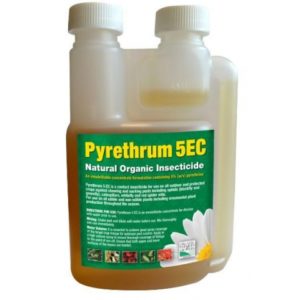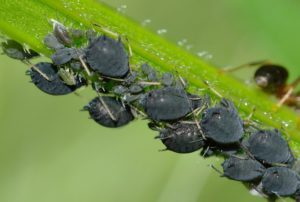August 15th, 2018 by
With several common pesticides now banned by the EU, many professional and amateur gardeners are looking for an alternative to keep pests away from their plants. For many, pyrethrum ticks every box. It’s an organic pesticide that’s been used for centuries thanks to its bug-killing properties, it’s non-toxic to humans and animals, and it’s (in most cases) totally biodegradable. But what actually is pyrethrum, how can you use it, and is it safe? All of these questions – and more – will be answered below.
What is Pyrethrum?
 Pyrethrum actually refers to a number of flowers in the Chrysanthemum genus. The daisy-like flowers are natural insect deterrents, and the pesticide which is also called pyrethrum is extracted from these flowers. Don’t confuse pyrethrum with pyrethrins, which are processed versions of pyrethrum and are a common ingredient in indoor pesticides, head louse treatments, and so on. As pyrethrum is an all-natural organic pesticide, it’s biodegradable.
Pyrethrum actually refers to a number of flowers in the Chrysanthemum genus. The daisy-like flowers are natural insect deterrents, and the pesticide which is also called pyrethrum is extracted from these flowers. Don’t confuse pyrethrum with pyrethrins, which are processed versions of pyrethrum and are a common ingredient in indoor pesticides, head louse treatments, and so on. As pyrethrum is an all-natural organic pesticide, it’s biodegradable.
How Does Pyrethrum Work?
Pyrethrum works by attacking the nervous system of insects. Insect nervous systems are a relatively simple chain of salts which carry signals from the insect’s brain around its body. Pyrethrum disrupts these channels of salts, paralysing and killing the insect.
Is Pyrethrum Toxic?
Not in small, diluted doses. Compared to other pesticides, pyrethrum is of very low toxicity, so if you use it properly it won’t harm humans or animals at all.
Is All Pyrethrum the Same?
 No! This is an important detail to remember. Pure pyrethrum isn’t that effective as often the paralysed insects can revive. Because of this, most pyrethrum brands are actually a solution of pyrethrum and other ingredients. The pyrethrum on our website is mixed with piperonyl butoxide, another organic compound so it is non-toxic and biodegradable, however, many other brands of pyrethrum aren’t. Always make sure you check before you use it.
No! This is an important detail to remember. Pure pyrethrum isn’t that effective as often the paralysed insects can revive. Because of this, most pyrethrum brands are actually a solution of pyrethrum and other ingredients. The pyrethrum on our website is mixed with piperonyl butoxide, another organic compound so it is non-toxic and biodegradable, however, many other brands of pyrethrum aren’t. Always make sure you check before you use it.
Can I Use Pyrethrum to Kill Lice on Humans and Animals?
No. While commercial head louse shampoo, flea killer, and other similar products often contain pyrethrum, they make use of a much weaker dose. The pyrethrum that’s used in gardens is much stronger, so while indirect exposure to it won’t harm people or animals, it shouldn’t be applied directly to the skin.
How Do I Apply Pyrethrum?
Pyrethrum comes in small, highly concentrated bottles, so you’ll need to dilute it before you use it. Use around 4ml of pyrethrum for every 1 litre of water when mixing your solution. You can then spray the pyrethrum solution onto your plants.
What Pests Does Pyrethrum Control?
 Pyrethrum kills most insects found in the UK, including aphids, blackfly, caterpillars, lice, red mites, thrips, and whitefly among many others. One thing to be aware of is that pyrethrum can affect other more helpful insects such as bees and ladybirds, so you do need to be careful in how you use it. Consider spraying early in the morning or in the evening when bees are less active, and cover your plants with a sheet for 24 hours after spraying to help keep bees away while the pyrethrum gets to work on the target pests.
Pyrethrum kills most insects found in the UK, including aphids, blackfly, caterpillars, lice, red mites, thrips, and whitefly among many others. One thing to be aware of is that pyrethrum can affect other more helpful insects such as bees and ladybirds, so you do need to be careful in how you use it. Consider spraying early in the morning or in the evening when bees are less active, and cover your plants with a sheet for 24 hours after spraying to help keep bees away while the pyrethrum gets to work on the target pests.
Does Pyrethrum Affect My Plants?
No. As most brands of Pyrethrum are largely organic, it’s biodegradable. If you want to harvest fruit or vegetables after treating them with pyrethrum, you can do so after just 24 hours.
Does Pyrethrum Affect My Pets or Livestock?
 No. While you will obviously need to use a little common sense and not spray large quantities of pyrethrum directly onto your animals, it is safe to use in homes with pets and on farms with livestock or poultry. If you have a pond, be aware that pyrethrum can affect fish if it gets into their water. Use caution when spraying near the pond.
No. While you will obviously need to use a little common sense and not spray large quantities of pyrethrum directly onto your animals, it is safe to use in homes with pets and on farms with livestock or poultry. If you have a pond, be aware that pyrethrum can affect fish if it gets into their water. Use caution when spraying near the pond.
Can Pests Develop a Resistance to Pyrethrum?
As far as we know, no. This is because of the active components in pyrethrum that make it hard to develop a resistance to, making it one of the most effective methods of pest control.
What Are the Side Effects of Pyrethrum?
For most people, pyrethrum is safe to use with minimal side effects as it’s often diluted so much that it doesn't affect us. However, exposure to concentrated doses of pyrethrins can trigger symptoms in asthma sufferers. If you know you have an allergy to chrysanthemums, daisies, marigolds, or related plants, pyrethrum may trigger an allergic reaction, so consult a doctor before you use it.
Comments
Leave a reply
Your e-mail address will not be published. All fields are required


